╔
Transformación digital y fomento de la innovación en el Puerto de Málaga como motores de sostenibilidad
En el año 2019 se aprueba la iniciativa “Málaga, Puerto Verde”, este reto surge del deseo de integrar la dimensión ambiental del Puerto en el contexto donde se sitúa, es decir, en una ciudad como Málaga que ha basado su estrategia de crecimiento en el turismo, la cultura, la innovación y el medio ambiente.
En este sentido desde ese año, la Autoridad Portuaria se suma a los objetivos de la Agenda 2030 para el Desarrollo Sostenible, con la meta de introducir criterios de sostenibilidad en la toma de decisiones estratégicas tanto de la Autoridad Portuaria, como de su Comunidad Portuaria, a fin de garantizar la sustentabilidad de las operaciones logísticas y de los servicios portuarios a medio y largo plazo.
El Puerto de Málaga busca de esta forma fortalecer su posición como un referente en sostenibilidad, abordando el cambio climático y la descarbonización de sus actividades. Además, reconoce los beneficios de la digitalización en términos de eficiencia, seguridad y sostenibilidad ambiental, y destaca la necesidad de adoptar soluciones digitales para garantizar su competitividad.
Para ello despliega de forma coordinada con los Objetivos de Desarrollo Sostenible (ODS), con el Marco Estratégico de Puertos del Estado, y con el Plan Estratégico 2024-2030, cuatro ejes de actuación a fin de reforzar su posicionamiento como un puerto sostenible, eficiente, digitalizado y comprometido con el desarrollo de su entorno, a fin de convertirse en un referente en la fachada mediterránea. Cuya misión es impulsar, en colaboración con la Comunidad Portuaria, el resto de instituciones y la Ciudad, el desarrollo logístico, industrial y turístico en nuestra zona de influencia, a través de la oferta de una infraestructura, servicios y conexiones intermodales competitivas, contribuyendo así sosteniblemente al desarrollo del tejido empresarial.
De forma coordinada la visión se enfoca a través de su conversión en un nodo intermodal de referencia para la conexión entre los continentes europeo y africano, y fuerza motriz para el desarrollo sostenible e innovador de la logística, la industria y el turismo de Málaga y Andalucía. Destacando entre sus valores por el compromiso con la innovación tecnológica; el buen gobierno, la transparencia y la ética corporativa, así como por su compromiso con el desarrollo ambiental y la responsabilidad socio-turística.
Los cuatro ejes de actuación de la política estratégica 2024-2030, junto a sus objetivos, se despliegan sobre los principios de:
- Eje 1. Crecimiento sostenible de la actividad portuaria.
- Eje 2. Puerto verde, digital e innovador.
- Eje 3. Ciudad portuaria de referencia.
- Eje 4. Puerto optimizado, transparente y participativo.
In 2019, the “Malaga, Green Port” initiative was approved, arising from the desire to integrate the environmental dimension of the Port within the context where it is situated, namely, in a city like Malaga that has based its growth strategy on tourism, culture, innovation, and the environment.
Since then, the Port Authority has aligned with the objectives of the 2030 Agenda for Sustainable Development, aiming to introduce sustainability criteria into the strategic decision-making processes of both the Port Authority and its Port Community. This is to ensure the sustainability of logistics operations and port services in the medium and long term.
The Port of Malaga seeks to strengthen its position as a leader in sustainability by addressing climate change and decarbonizing its activities. It also recognizes the benefits of digitization in terms of efficiency, safety, and environmental sustainability, highlighting the need to adopt digital solutions to ensure competitiveness.
In coordination with the Sustainable Development Goals (SDGs), the Strategic Framework of State Ports, and the 2024-2030 Strategic Plan, four lines of action are deployed to reinforce its positioning as a sustainable, efficient, digitized port committed to the development of its surroundings, aiming to become a reference point in the Mediterranean region. Its mission is to promote, in collaboration with the Port Community, other institutions, and the City, the logistic, industrial, and touristic development in our area of influence, through the offer of competitive infrastructure, services, and intermodal connections, thus contributing sustainably to the development of the local economy.
Coordinated with the Strategic Plan for the Port of Malaga 2024-2030, the vision focuses on becoming a reference intermodal hub for the connection between the European and African continents, acting as a driving force for sustainable and innovative development in logistics, industry, and tourism in Malaga and Andalusia. It emphasizes values such as commitment to technological innovation, good governance, transparency, corporate ethics, environmental development, and socio-touristic responsibility.
The four lines of action of the 2024-2030 Strategic Policy, along with their objectives, are deployed based on the principles of:
- A-1: Sustainable growth of port activity.
- A-2: Green, digital, and innovative port.
- A-3: Reference port city.
- A-4: Optimized, transparent, and participatory port.
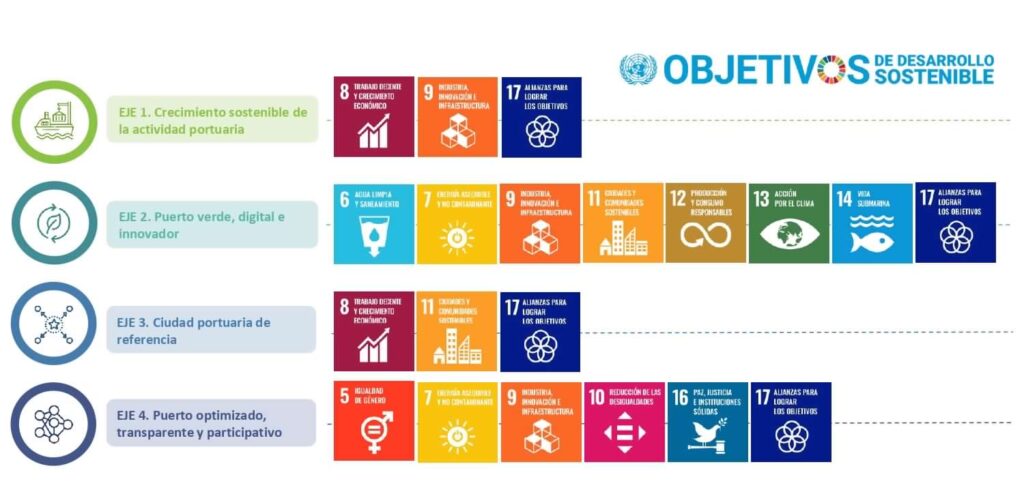
Coordinación Plan Estratégico Puerto Málaga 2024-2030 con ODS. (Fuente: Autoridad Portuaria de Málaga).
Coordination of the Strategic Plan for the Port of Malaga 2024-2030 with SDGs. (Source: Port Authority of Malaga).
El primero de ellos se refiere a la sostenibilidad ambiental, social y económica, avanzando en el desarrollo de infraestructuras de cogeneración; la utilización de energía eléctrica de origen exclusivamente renovable; el fomento del uso de combustibles alternativos como el gas natural licuado o el hidrógeno verde; la creación de masas verdes en la frontera en el puerto y la ciudad; la transformación de la flota de vehículos hacia eléctricos o híbridos, y el fomento de la intermodalidad a través de un apoyo decido y firme al transporte de mercancías por ferrocarril. También se están desarrollando políticas de sostenibilidad socio turística, a fin de compatibilizar la llegada de turistas, con la vida cotidiana de los malagueños, evitando problemas de congestión y masificación en los principales atractivos turísticos, contribuyendo a una coexistencia pacífica entre ambos.
The first axis refers to environmental, social, and economic sustainability, advancing in the development of co-generation infrastructures, the use of electricity from exclusively renewable sources, the promotion of alternative fuels such as liquefied natural gas or green hydrogen, the creation of green spaces in the port and city areas, the transition of the vehicle fleet to electric or hybrid, and the promotion of intermodally through decisive support for rail freight transport. Policies are also being developed for socio-touristic sustainability to reconcile tourism influx with the daily life of residents, avoiding congestion and overcrowding in main tourist attractions.
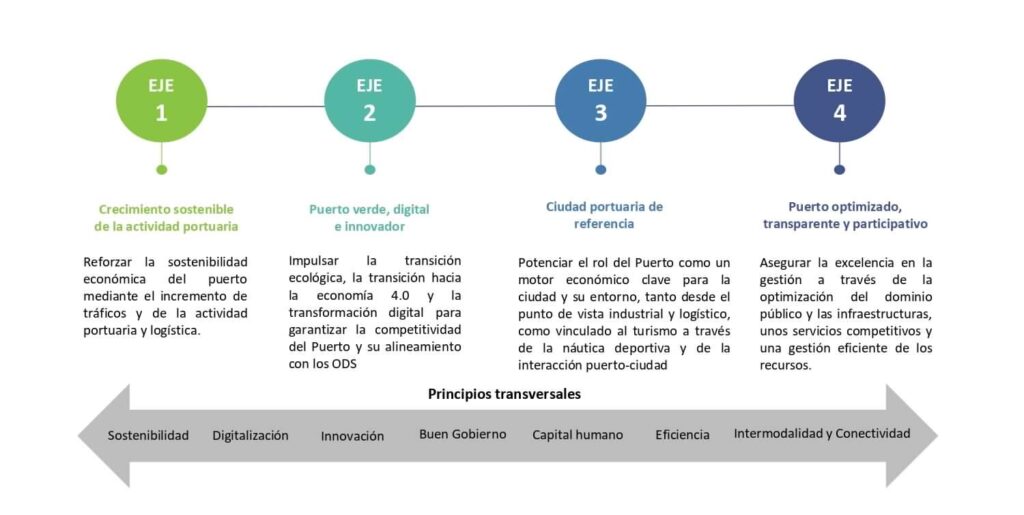
Ejes actuación. Plan Estratégico Puerto Málaga 2024-2030. (Fuente: Autoridad Portuaria de Málaga).
Action Plan. Strategic Plan for the Port of Malaga 2024-2030. (Source: Port Authority of Malaga).
Asimismo, adicionalmente a la transformación ambiental, turística y energética, el Puerto de Málaga se quiere posicionar como un referente en la transformación digital, con el fin de contribuir a la eficiencia, la mejora de la conectividad, la seguridad y la sostenibilidad del sector portuario y su economía. Para ello, se asume como imprescindible su conversión en un puerto inteligente, hiperconectado y sincromodal que impulse la innovación.
Entendemos este proceso de innovación en su sentido amplio, que debe estar latente en todos los campos de actividad en los que se desenvuelve el Puerto (logístico, de seguridad, etc.), incluso en los ámbitos de las relaciones puerto ciudad y turístico. En este sentido el Puerto viene desarrollando numerosas iniciativas, a fin de permitir la paulatina digitalización e integración tecnológica de toda la comunidad portuaria que presta sus servicios en el Puerto de Málaga. Podemos destacar entre otras, las siguientes iniciativas:
1. La reciente adjudicación de la implantación de un sistema digital de gestión portuaria que permite la automatización de procesos administrativos; la supervisión integral de todas las operaciones portuarias; la transformación del puerto de Málaga en un Smart Port y la comunicación entre agentes. Todo ello con el objetivo decido de avanzar hacia la implantación del Puerto como una Ventanilla Única Local, convirtiéndolo en un “Puerto sin papeles”, alineándonos así con los Objetivos de Desarrollo Sostenible de la Agenda 2030, con lo establecido en el Marco Estratégico de Puertos del Estado, así como con nuestro Plan Estratégico, recientemente aprobado.
2. La colaboración con grandes corporaciones tecnológicas y los operadores de la comunidad portuaria está consolidando una senda de innovación, que sitúa en el foco de sus procesos estratégicos la transformación digital y la implementación de procesos de innovación mediante el desarrollo de funcionalidades. Estos procesos de desarrollo e innovación, debido a su carácter tractor y transversal, sirven de palanca para la consecución de los objetivos previstos en el Plan Estratégico 2024-2030.
Additionally, besides environmental, touristic, and energy transformation, the Port of Malaga aims to position itself as a leader in digital transformation to contribute to the efficiency, connectivity, security, and sustainability of the port sector and its economy. To achieve this, it is essential to convert it into a smart, hyper-connected, and synchro modal port that drives innovation.
This innovation process is understood in a broad sense, permeating all fields of activity in which the port operates (logistics, security, etc.), including port-city and touristic relations. Numerous initiatives are being developed to gradually digitize and technologically integrate the entire port community serving at the Port of Malaga. Among others, recent initiatives include:
1. The recent awarding of the implementation of a digital port management system enabling the automation of administrative processes, comprehensive supervision of all port operations, transforming the Port of Malaga into a Smart Port, and facilitating communication between stakeholders. All with a clear objective of advancing towards the establishment of the Port as a Local Single Window, making it a “Paperless Port”, aligning with the Sustainable Development Goals of the 2030 Agenda, the Strategic Framework of Ports of Spain, and our recently approved Strategic Plan.
2. Collaboration with major technology corporations and port community operators is consolidating a path of innovation, placing digital transformation and the implementation of innovation processes at the forefront of strategic processes. These development and innovation processes, due to their driving and transversal nature, serve as leverage for achieving the objectives set out in the 2024-2030 Strategic Plan.
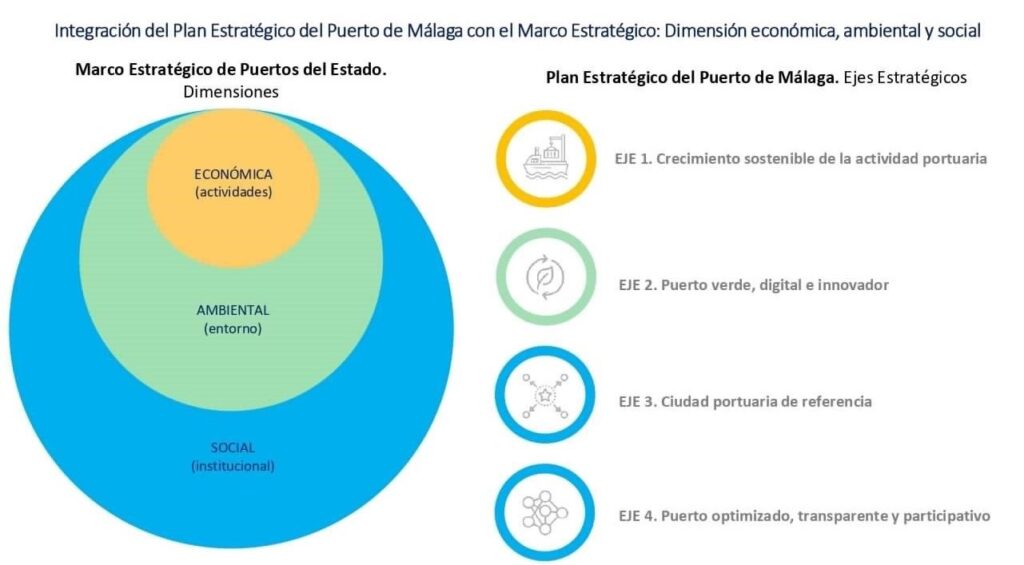
Integración Marco Estratégico Puertos del Estado. (Fuente: Autoridad Portuaria de Málaga).
Integration Framework of State Ports Strategic Plan. (Source: Port Authority of Malaga).
Entre estos proyectos piloto encontramos soluciones digitales basadas en la aplicación de la tecnología 5G, el Internet de las cosas (IOT) y la aplicación de inteligencia artificial (AI) para facilitar la toma de decisiones y la gestión portuaria. En este sentido durante el año pasado se han desplegado de la mano de Telefónica, Vodafone y Orange tres proyectos piloto de innovación que han tenido su foco en distintos ámbitos portuarios:
- Mercancías y Logística: Mejora en el seguimiento, trazabilidad y control de mercancías dentro del recinto portuario, hasta su paso por el Puesto de Control Fronterizo.
- Seguridad: Control de la lámina de agua en la zona de servicio, a fin de realizar la detección temprana y autónoma de accesos a la misma por parte de embarcaciones no autorizadas.
- Turismo: Con el desarrollo de una aplicación que permita conocer en tiempo real los movimientos y las tendencias de los cruceristas que utilizan nuestro puerto de visita nuestra ciudad, a fin de evitar aglomeraciones indeseadas que afectan tanto a su propia experiencia en el destino como a los residentes de Málaga. En este sentido se está trabajando en el desarrollo soluciones que permitan anticipar las decisiones acerca de cuál puede ser las distintas visitas que se realicen en la ciudad a fin de no colapsar su centro histórico.
Among these pilot projects, some digital solutions are being developed, based on 5G technology, the Internet of Things (IoT), and the application of artificial intelligence (AI) to facilitate decision-making and port management. In this regard, last year, three pilot innovation projects were deployed in collaboration with Telefónica, Vodafone, and Orange, focusing on different areas of the port:
- Transport and Logistics: Improvements in tracking, traceability, and control of goods within the port area, up to their passage through the Border Control Point.
- Security: Monitoring of the water surface in the service area to enable early and autonomous detection of unauthorized vessel access.
- Tourism: Development of an application to provide real-time insights into the movements and trends of cruise ship passengers visiting our port and city. This aims to prevent undesirable overcrowding that affects both their experience at the destination and the residents of Malaga. Additionally, efforts are underway to develop solutions to anticipate decisions regarding the various visits to the city to avoid overwhelming its historical center.

Iniciativas desarrollos aplicativos en el Puerto Málaga. (Fuente: Autoridad Portuaria de Málaga).
Initiatives and Application Developments in the Port of Malaga. (Source: Port Authority of Malaga).
3. No podemos dejar de mencionar la apuesta decidida por la iniciativa Puertos 4.0 de Puertos del Estado, a través del apoyo activo a propuestas relacionadas con la digitalización de la actividad portuaria; las soluciones de gestión medioambiental para mejorar la relación puerto-ciudad; y el impulso al sector logístico-portuario, y al náutico a través de sistemas de innovación.
La innovación es considerada fundamental para mejorar la prestación de servicios y la gestión portuaria, permitiendo además adaptarse a los cambios del comercio internacional y de las cadenas globales del transporte, a través de las nuevas tecnologías.
3. The resolute commitment to the Ports 4.0 initiative by Ports of Spain, through actively supporting proposals related to the digitalization of port activity, environmental management solutions to improve the port-city relationship, and the promotion of the logistics-port sector and the nautical sector through innovation systems.
Innovation is considered fundamental for improving service provision and port management, allowing the adaptation in international trade and global transportation chains through new technologies.
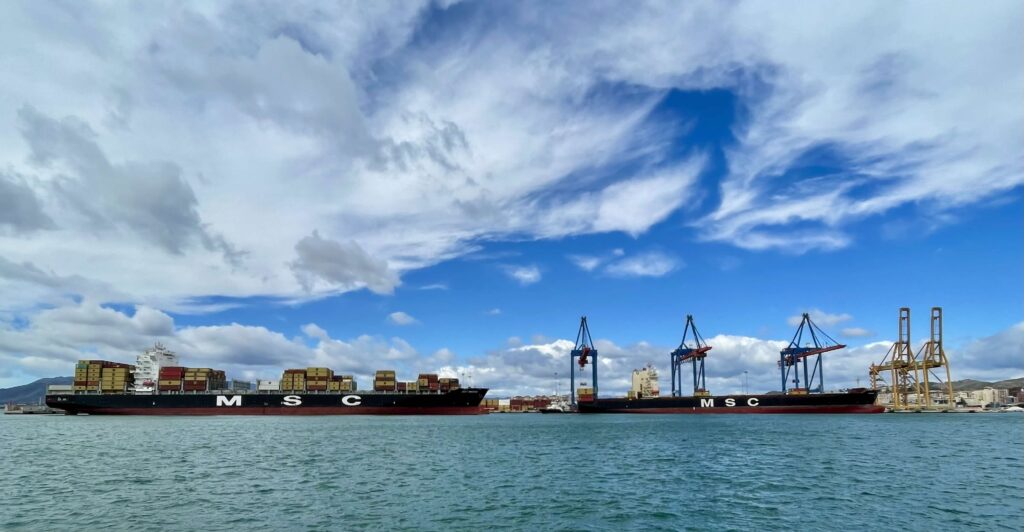
Operativa contenedor. (Fuente: Fundación Málagaport).
Container Operations. (Source: Málagaport Foundation).
En este sentido, entendemos que esta senda debe ser recorrida conjuntamente con el ecosistema innovador local, entre los que se encuentran instituciones tan prestigiosas como el Málaga TechPark; la Universidad Internacional de Andalucía; el Vodafone Research Center; la Fundación CIEDES; la Universidad de Málaga y el Centro de Ciberseguridad de la Junta de Andalucía. Con todos ellos se han alcanzado acuerdos de colaboración para que puedan posicionarse en la zona de servicios y sus proximidades, a fin de consolidar al Puerto como un referente en innovación relacionada con la logística internacional, el turismo, la náutica y la economía azul.
En este sentido la Universidad Internacional de Andalucía ha trasladado recientemente su sede tecnológica al Instituto de Estudios Portuarios del Puerto de Málaga. Este acuerdo se enmarca en la apuesta por la actividad docente y el impulso a proyectos vinculados a la innovación educativa. La iniciativa es un paso más hacia el compromiso del Puerto por crear espacios de innovación, y apostar por la formación para el empleo relacionado con la internacionalización del sector productivo al que servimos. Además, esta nueva sede va a permitir la creación de un Centro Especializado en Tecnologías Inteligentes aplicadas a la Educación (CETIE-UNIA), un espacio orientado a la investigación y transferencia del conocimiento, dentro del sector educativo, con el que ofrecer herramientas, recursos y metodologías de interés para docentes, investigadores y profesionales. Lo que permitirá a su vez generar polos de alianzas estratégicas para el impulso de la formación de profesionales del transporte, la logística, la náutica y la economía azul, entre otras.
Igualmente destacable es el acuerdo alcanzado con Málaga TechPark, el Parque Tecnológico de Andalucía, para el fomento de la actividad innovadora y de emprendimiento en el Puerto de Málaga. El protocolo suscrito tiene por objeto establecer la colaboración entre Málaga TechPark, la Autoridad Portuaria de Málaga y la Fundación MálagaPort, para lograr el desarrollo de un modelo común de colaboración centrado en la realización de proyectos conjuntos de I+D+i y en el emprendimiento dentro de la zona de servicio del Puerto y del que se pueda beneficiar la Comunidad Portuaria.
In this regard, we understand that this path must be traveled together with the local innovative ecosystem, which includes prestigious institutions such as Malaga TechPark, the International University of Andalusia, the Vodafone Research Center, the CIEDES Foundation, the University of Malaga, and the Cybersecurity Center of the Andalusian Government. Collaboration agreements have been reached with all of them to position themselves in the service area and its surroundings, consolidating the Port as a reference in innovation related to international logistics, tourism, nautical activities, and blue economy.
In this context, the International University of Andalusia has recently relocated its technological headquarters to the Port of Malaga’s Port Studies Institute. This agreement is part of the commitment foster teaching activity and projects linked to educational innovation. The initiative is a step further in the Port’s commitment to creating innovation spaces and promoting training for employment related to the internationalization of the productive sector it serves. Additionally, this new headquarters will allow the creation of a Specialized Center in Intelligent Technologies applied to Education. A space focused on research and knowledge transfer within the educational sector, offering tools, resources, and methodologies of interest to teachers, researchers, and professionals. This, in turn, will generate poles of strategic alliances to promote the training of professionals in transportation, logistics, nautical activities, and blue economy, among others.
Deepening in the innovation diversification strategy, is the agreement reached with Malaga TechPark, the Technological Park of Andalusia, to promote innovative activity and entrepreneurship in the Port of Malaga. The protocol signed aims to establish collaboration between Malaga TechPark, the Port Authority of Malaga, and the Málagaport Foundation, to develop a common collaboration model focused on joint R&D&I projects and entrepreneurship within the port service area, benefiting the Port Community.
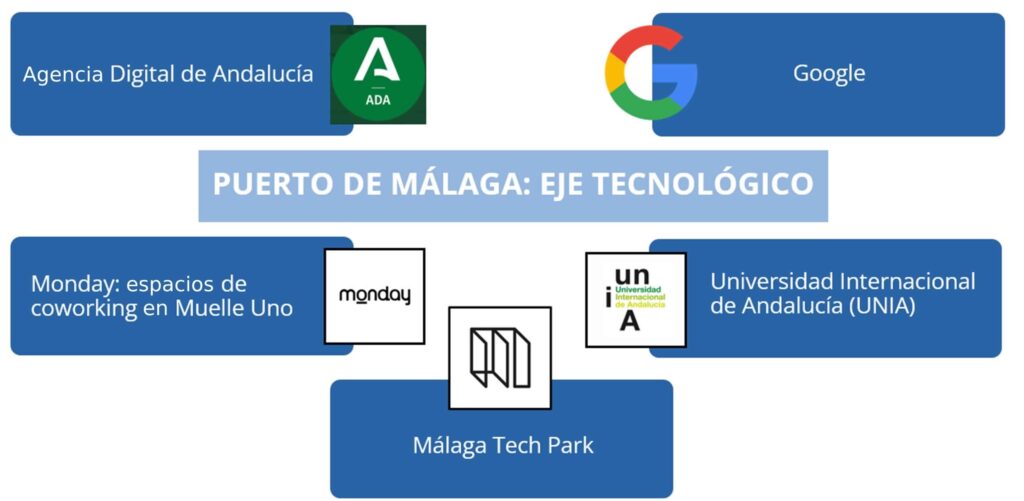
Ecosistema tecnológico e innovador del Puerto de Málaga. (Fuente: Autoridad Portuaria de Málaga).
Technological and Innovative Ecosystem of the Port of Malaga. (Source: Port Authority of Malaga).
Ambas instituciones apuestan por la creación de nuevas sinergias entre ambas, en su condición de catalizadores del desarrollo económico regional y dinamizadores de la economía y la tecnología. Así, ambas partes se comprometen a trabajar conjuntamente, impulsando la creación de un entorno de interacción entre actividad, industria y empresa, fomentando la transferencia de investigación y la formación en el espacio del parque y trasladando la actividad empresarial y de innovación desarrollada por el parque al espacio del puerto. Esta alianza estratégica convierte al puerto en una prolongación del parque tecnológico en el centro de la ciudad, permitiendo además la colaboración y la cooperación entre todas las empresas tecnológicas e incubadoras de innovación, y los operadores de servicios logísticos y portuarios dentro de nuestra zona de servicio.
Tanto la tecnópolis malagueña como el propio Puerto se han convertido ya en motores socioeconómicos de la ciudad de Málaga y de su área de influencia. En este sentido, Málaga TechPark se ha convertido en un elemento de dinamización de la economía andaluza, provincial y local alrededor de las nuevas tecnologías digitales, configurándose como un ejemplo de cooperación entre empresas, universidades y centros de conocimiento.
Por su parte, las actuaciones realizadas en los últimos años han convertido al recinto portuario en una parte cada vez más activa de la ciudad, con zonas para la ubicación de empresas, zonas culturales y de ocio, comercios y restauración, con una integración creciente del Puerto y la ciudad de Málaga.
Así, el Puerto, con su creciente actividad turística y logística y la consolidación del proyecto de integración de los muelles 1 y 2, hace del recinto un espacio de oportunidad para la innovación y el desarrollo, como lo demuestra la reciente ubicación de la sede de la Agencia Digital de Andalucía (ADA) a través del Centro de Ciberseguridad en el Palmeral de las Sorpresas del Muelle 2.
Both institutions are committed to creating new synergies between them, serving as catalysts for regional economic development and drivers of the economy and technology. As such, both parties pledge to work together, fostering the creation of an environment for interaction among activity, industry, and business, promoting research transfer and training within the park’s space, and transferring business and innovation activity developed by the park to the port space. This strategic alliance turns the port into an extension of the technological park in the city center, enabling collaboration and cooperation among all technology companies, innovation incubators, and logistics and port service operators within our service area.
Both the Malaga Technopolis and the Port itself have already become socioeconomic engines of the city of Malaga and its area of influence. In this regard, Malaga TechPark has become a driving force of the Andalusian, provincial, and local economy around digital technologies, serving as an example of cooperation between companies, universities, and knowledge centers.
On the other hand, the integration between the city and the port implemented years ago, have turned the port area into an increasingly active part of the city, with areas for business location, cultural and leisure zones, shops, and restaurants, with a growing integration of the Port and the city of Malaga.
Thus, with its growing tourism and logistics activity and the consolidation of the integration project of Muelle 1 and 2, the port area becomes a space of opportunity for innovation and development, as evidenced by the recent location of the headquarters of the Digital Agency of Andalusia (DAA) through the Cybersecurity Center in the Palm Grove of Surprises of Muelle 2.
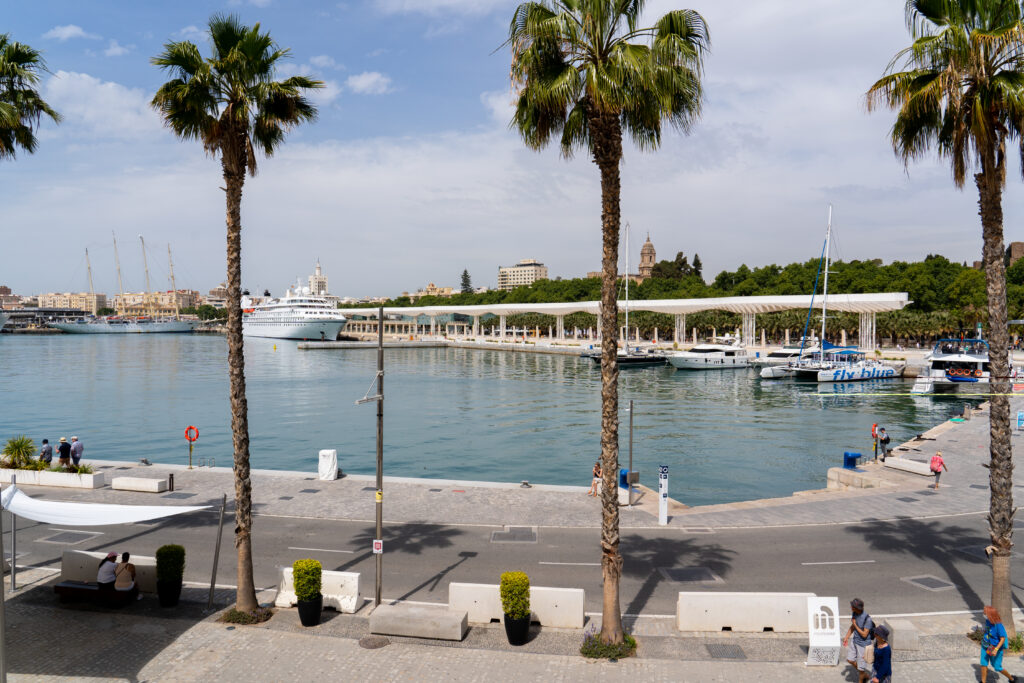
Palmeral de las Sorpresas Muelle 2. Puerto de Málaga. (Fuente: Fundación Málagaport).
Palm Grove of Surprises, Muelle 2. Port of Malaga. (Source: Málagaport Foundation).
Desde el Centro de Ciberseguridad se van a controlar los servicios esenciales necesarios para el funcionamiento de las instituciones públicas, infraestructuras críticas y aquellas sobre las que se sustentan las redes de Andalucía, pero su efecto protector irá mucho más allá, proporcionando confianza y protección a ciudadanos, empresas privadas e instituciones públicas en el ecosistema digital andaluz.
Además, el Centro de Ciberseguridad de Andalucía se configura también como un espacio dinamizador y transformador desde donde se van a llevar a cabo campañas y actividades de concienciación y sensibilización para contribuir a una mejora de las capacidades frente a las ciberamenazas y se van a crear y ofrecer planes de formación, herramientas de diagnóstico e incentivos para que las empresas andaluzas incorporen la ciberseguridad en su día a día.
Por tanto, el Puerto de Málaga junto al resto de las instituciones de la ciudad, comparten rumbo decidido hacia un escenario en el que posicionarse como referente en la transformación digital, con el fin de asegurar la eficiencia, conectividad, seguridad y sostenibilidad del sector portuario y su economía. Asumiendo como imprescindible su conversión en un puerto inteligente, hiperconectado y sincro modal que impulsa la innovación.
From the Cybersecurity Center, essential services necessary for the functioning of public institutions, critical infrastructure, and those on which the networks of Andalusia rely will be monitored. However, its protective effect will extend much further, providing confidence and protection to citizens, private companies, and public institutions in the Andalusian digital ecosystem.
Moreover, the Andalusian Cybersecurity Center is also configured as a dynamic and transformative space from where awareness campaigns and activities will be carried out to contribute to improving capabilities against cyber threats. Plans for training, diagnostic tools, and incentives will be created and offered to encourage Andalusian companies to incorporate cybersecurity into their daily operations.
Therefore, the Port of Malaga, along with the other institutions of the city, shares a determined course towards a scenario where they position themselves as leaders in digital transformation, aiming to ensure the efficiency, connectivity, security, and sustainability of the port sector and its economy. This involves considering it essential to convert the port into an intelligent, hyper-connected, and synchro modal port that drives innovation.
IMAGEN INICIAL | Vista panorámica del puerto y de la ciudad de Málaga. (Fuente: Fundación Málagaport).
HEAD IMAGE | Panoramic view of the Port and City of Malaga. (Source: Malagaport Foundation).